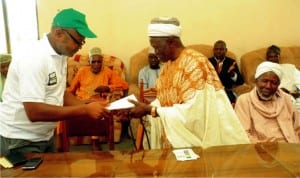Business
‘Nigeria Must Stop Importing What It Has’

Zonal Coordinator, North Central, National Film and Video Censors Board, Mr Ailewon Danlami (L), presenting letter of partnership to Chief Imam of Jos, Sheik Lawan Adamu, during the Media Literacy Project and Sensitisation on Nigeria Movies to the public in Jos.With them is the administrative secretary, Jama’atu Nasril Islam Sheik Abdulaziz Yusuf.
The Emir of Kano, Alhaji
Muhammadu Sanusi II, on Saturday said Nigeria must stop importing what it has in order to boost local industries and create jobs.
The Emir stated this in Kaduna while inaugurating the new Council Secretariat of the Kaduna Chamber of Commerce, Industry, Mines and Agriculture (KACCIMA).
Sanusi said the current economic crisis induced by the crash in global oil price, should serve as a wake up call for the country to utilise its resources judiciously.
“Nigeria is full of experts in importing what we have and exporting what we do not have.
“We have cotton but we import textile materials from China; we have crude oil but we import fuel refined from our own crude from Russia and other countries.
“We have gas but we let it flare away instead of utilising it to produce power, yet import generators from outside.
“We eat our hides and skin and import shoes from outside, and we eat our tomatoes and import canned tomatoes paste from China.”
The Emir said things must change, and advised the Federal Government to give priority to education, industries, power and agriculture.
Sanusi noted that the textile industries in the past had employed more than 600, 000 people at a time.
He therefore advised industrialists to be in the vanguard of advising the administration on key directions to move the economy forward and always draw the attention of government when it derails from targeted national goals.
The Emir stressed that the persistent conflicts in the country were largely due to economic hardships and not religion or tribal sentiments.
He expressed the belief that the resuscitation of Nigeria’s industrial base would offer massive employment ant take off the streets, the huge number of idle youths used to foment crisis.
On the current economic hardship in the country, the Emir said Nigerians must be educated to appreciate that it was due to the low revenue accruing to government as a result of the fall in oil price.
“It is not possible to continue doing what you are doing when the price of oil was at $110 and now that it is selling at about $30.
“People ought to realise that the price of oil has bearing on the current hike in goods and services, and until things change, we must have to adjust our needs as a nation.”
Sanusi also spoke on the effect of smuggling on the nation’s economy and called for massive enlightenment to educate those involved on the harm they inflict on the wellbeing of the common man.
He called on religious leaders, to use their sermons in Mosques and Churches, to call for boycott of foreign goods and for patronage of Made-in-Nigeria products.
Earlier, the President of the Chamber, Dr Abdul Alimi-Bello, expressed the group’s appreciation to the Emir for his continuous support.
He disclosed that the chamber had set up a committee to establish a library on Nigeria’s economic potentials.
Business
PENGASSAN Tasks Multinationals On Workers’ Salary Increase

Business
SEC Unveils Digital Regulatory Hub To Boost Oversight Across Financial Markets

Business
NAFDAC Decries Circulation Of Prohibited Food Items In markets …….Orders Vendors’ Immediate Cessation Of Dealings With Products

Importers, market traders, and supermarket operators have therefore, been directed to immediately cease all dealings in these items and to notify their supply chain partners to halt transactions involving prohibited products.
The agency emphasized that failure to comply will attract strict enforcement measures, including seizure and destruction of goods, suspension or revocation of operational licences, and prosecution under relevant laws.
The statement said “The National Agency for Food and Drug Administration and Control (NAFDAC) has raised an alarm over the growing incidence of smuggling, sale, and distribution of regulated food products such as pasta, noodles, sugar, and tomato paste currently found in markets across the country.
“These products are expressly listed on the Federal Government’s Customs Prohibition List and are not permitted for importation”.
NAFDAC also called on other government bodies, including the Nigeria Customs Service, Nigeria Immigration Service(NIS) Standards Organisation of Nigeria (SON), Nigerian Ports Authority (NPA), Nigerian Maritime Administration and Safety Agency (NIMASA), Nigeria Shippers Council, and the Nigeria Agricultural Quarantine Service (NAQS), to collaborate in enforcing the ban on these unsafe products.
-

 Politics1 day ago
Politics1 day agoSenate Receives Tinubu’s 2026-2028 MTEF/FSP For Approval
-

 News1 day ago
News1 day agoDangote Unveils N100bn Education Fund For Nigerian Students
-

 News1 day ago
News1 day agoRSG Lists Key Areas of 2026 Budget
-

 News1 day ago
News1 day agoTinubu Opens Bodo-Bonny Road …Fubara Expresses Gratitude
-
News1 day ago
Nigeria Tops Countries Ignoring Judgements -ECOWAS Court
-

 Featured1 day ago
Featured1 day agoFubara Restates Commitment To Peace, Development …Commissions 10.7km Egbeda–Omerelu Road
-
News1 day ago
FG Launches Africa’s First Gas Trading Market, Licenses JEX
-

 Sports1 day ago
Sports1 day agoNew W.White Cup: GSS Elekahia Emerged Champions

